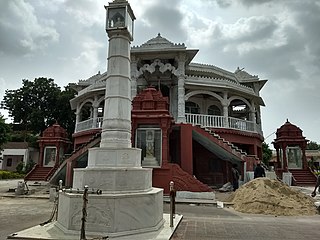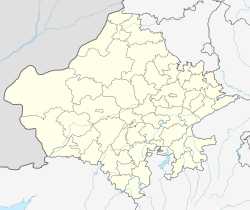
The Rajputana Agency was a political office of the British Indian Empire dealing with a collection of native states in Rajputana, under the political charge of an Agent reporting directly to the Governor-General of India and residing at Mount Abu in the Aravalli Range. The total area of the states falling within the Rajputana Agency was 127,541 square miles (330,330 km2), with eighteen states and two estates or chiefships.

The Banas is a river which lies entirely within the state of Rajasthan in western India. It is a tributary of the Chambal River, itself a tributary of the Yamuna, which in turn merges into the Ganga. The Banas is approximately 512 kilometres in length.

Sawai Madhopur district is a district of Rajasthan state in north-west India. Sawai Madhopur is the chief town and district headquarters. Sawai Madhopur district comes under Bharatpur division.

Ajmer district is a district in the Indian state of Rajasthan. It is part of the Ajmer division–one of the ten administrative divisions of Rajasthan. The city of Ajmer is the district headquarters. The district is situated in the center of Rajasthan, and is bounded by Didwana Kuchaman district to the north, Jaipur Rural and Dudu to the north-east, Tonk to the east, Kekri and Beawar to the south, and Nagaur to the west. It has an area of 8,481 km2 (3,275 sq mi), and a population of 2,583,052.

Bhilwara District is a district of the state of Rajasthan in western India. The city of Bhilwara is the district headquarters.

Tonk district is a district of the state of Rajasthan in western India. The city of Tonk is the administrative headquarters of the district. The district is bounded on the north by Jaipur district, on the east by Sawai Madhopur district, on the southeast by Kota district, on the south by Bundi district, on the southwest by Bhilwara district, and on the west by Ajmer district.

Bundi is a district in the state of Rajasthan in western India. The city of Bundi is the district headquarters. It has an area of 5,550 km2 and a population of 1,110,906. It is divided into 5 tehsils which are: Bundi, Hindoli, Nainwa, Keshoraipatan and Indergarh.

Tonk was a princely state in India under the supervision of the Rajputana Agency of the British Raj. It was located primarily in the present-day Indian state of Rajasthan with small portions in Madhya Pradesh. The town of Tonk, which was the capital of the state, had a population of 273,201 in 1901. As a salute state, its ruler, styled the Nawab of Tonk, was granted a 17-gun salute. The state came to an end after the partition of India when the Nawab of Tonk acceded to India. At that time, it was the only princely state of Rajputana with a Muslim ruling dynasty.
Aklera is a town and an Indian municipality in Jhalawar district in the state of Rajasthan. It is in the south-eastern region of Rajasthan at the edge of the Malwa plateau and has a rocky, scrub-covered terrain.
Jahazpur is a historical town and a municipality in Bhilwara district in the Indian state of Rajasthan. It is also the tehsil headquarters of the Jahazpur tehsil. It is known for the Jain temple swastidham, built around the Jahazpur fort.
Malpura is a town with municipality in Tonk district in the Indian state of Rajasthan. Malpura is known for its Dadabadi, built by the Khartargach Sect of Shewtambar Jain in memory of 3rd Dada Gurudev Shri Jinkushalsurishwarji.Also known for its Forts,Malpura is popular visiting palace in Rajasthan.
Nainwan is a tehsil of Bundi district and a municipality in the Hadoti region of the state of Rajasthan in India.

Newai or Niwai is a town, and a municipality and tehsil in Tonk district in the Indian state of Rajasthan. The Tonk district is bounded in the north by Jaipur district, in the east by Sawai Madhopur district, in the southeast by Kota district, in the south by Bundi district, in the southwest by Bhilwara district, and in the west by Ajmer district. Jaipur, capital of Rajasthan is the closest major city to Newai. In 1783 Nepalia-Mathur Kayastha of Jaipur estate occupied it after defeating Nawab of Tonk in a bloody battle fought at the fort of Rakhtanchal. Since then it was a vassal state to the Jaipur estate until Jaipur became part of Independent India. Darbar of Daroga ji ruled Niwai under Maharaja of Jaipur.
Uniara is a town and a municipality in Tonk district in the Indian state of Rajasthan. It is a tehsil of the Tonk district.
Bijainagar is a city and headquarters of Bijainagar tehsil in the Beawar district of the Indian state of Rajasthan.It was founded by Shri Rao Saheb Vijay Singh ji Of Masuda in 1919 CE,This city is situated along the Khari River close to the southern border of Ajmer District.

Rajasthan is one of the most popular tourist destinations in India, for both domestic and international tourists. Rajasthan attracts tourists for its historical forts, palaces, art and culture with its slogan "Padharo Mhare Desh " The capital city, Jaipur, also known as Pink City, is a very popular tourist destination and is a part of the Golden Triangle. The Walled City of Jaipur is only the second Indian city to be recognized as a UNESCO World Heritage Site, after Ahmedabad.

The Mathura–Vadodara section is a railway line connecting Mathura and Vadodara. This section is part of Delhi–Mumbai line. This section includes Jaipur–Sawai Madhopur, Ajmer–Ratlam and Udaipur–Kota for branching and connectivity to this section.
Devli Kalan is a village in Nawa Tehsil in Didwana Kuchaman district of Rajasthan State, India. It belongs to Ajmer Division. It is located 176 km towards East from District headquarters Nagaur, 60 km from State capital Jaipur. Devli Kalan Pin code is 341507 and postal head office is Maroth. Renwal, Jaipur, Sambhar, Phulera, Reengus are the nearby Cities to Devli Kalan. Minda, Loonwa, Shyamgarh & KANCHANPURA 1.5 km are the nearby Villages to Devli Kalan. As per constitution of India and Panchyati Raaj Act, Devli Kalan village is administrated by Sarpanch who is elected representative of village.












